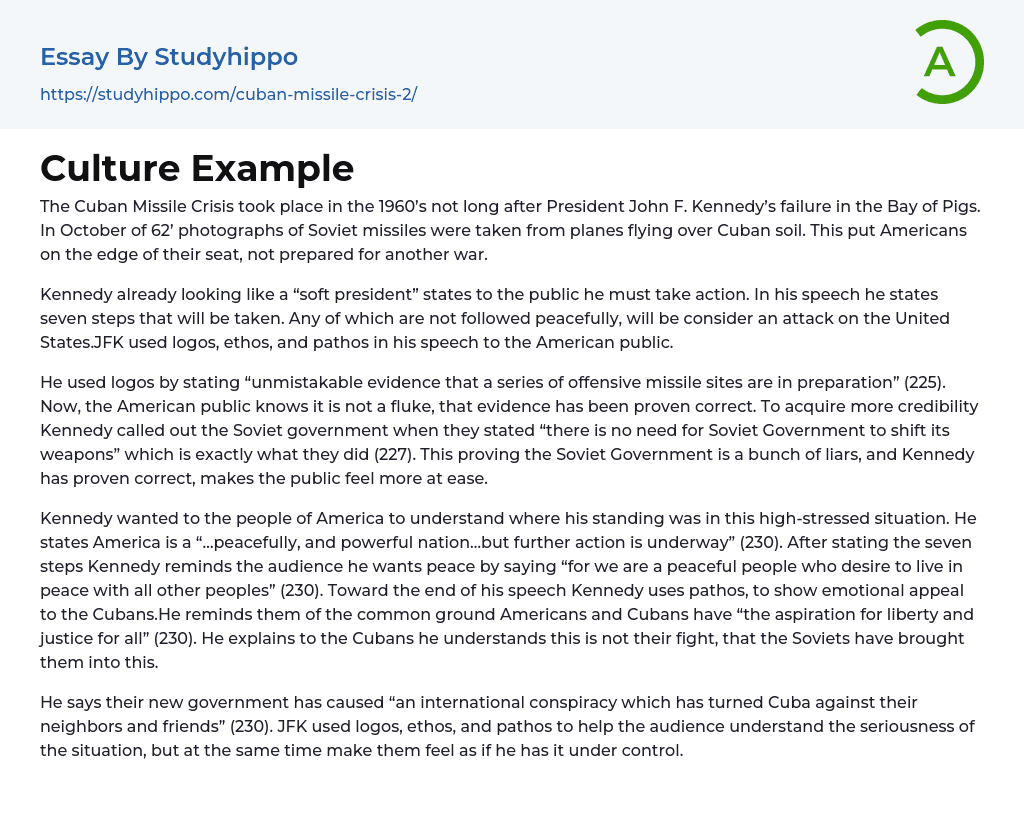The Cuban Missile Crisis occurred in the 1960s, shortly after President John F. Kennedy's unsuccessful attempt at the Bay of Pigs. In October of 1962, photos of Soviet missiles were captured by planes flying over Cuba, placing Americans on high alert and unprepared for another war.
Despite appearing to be a weak leader, Kennedy conveys to the people that he must act. During his speech, he outlines seven steps, any of which will be classified as a hostile act if they are not carried out through peaceful means. JFK uses logic, credibility and emotional appeal in his address to the citizens of America.
Utilizing logos, Kennedy declared that there is "distinct evidence that a sequence of aggressive missile sites are being developed" (225), thereby demonstrating that the evidence was accurate. This disclosure has authenticated that this occurrence was not by chance. Moreove
...r, to augment his trustworthiness, Kennedy challenged the Soviet government when they announced "there is no necessity for Soviet Government to shift its weapons" and yet they were found to have shifted their weapons (227). By accomplishing this, Kennedy has exhibited the dishonesty of the Soviet government and his prediction has been vindicated, thus calming the public.
Kennedy declared his position in the crisis, emphasizing that America is a peaceful and powerful nation and further action is imminent. He provided seven steps before reassuring the audience of his desire for peace, stating that Americans are peaceful people who desire to coexist harmoniously with all other nations. With emotional appeal towards the Cubans, Kennedy reminded them of America and Cuba's shared aspiration for liberty and justice. In understanding that this was not their fight, he clarified that the
Soviets had involved them in the conflict.
According to him, the recent regime change in Cuba has resulted in a global plot that has alienated the country from its allies and neighbors (230). JFK employed logic, ethics, and emotions to elucidate the gravity of the matter while assuring the audience that he has it managed.
- Frederick Douglass essays
- Mahatma Gandhi essays
- Joseph Stalin essays
- Geert Hofstede essays
- George Eliot essays
- Ginevra King essays
- John Keats essays
- Siegfried Sassoon essays
- Ben jonson essays
- Billy elliot essays
- Wilkie collins essays
- John Proctor essays
- Harriet Tubman essays
- Napoleon essays
- Robert E Lee essays
- Rosa Parks essays
- Dred Scott essays
- Business Law essays
- Contract essays
- Consumer Protection essays
- Property essays
- Ownership essays
- Agreement essays
- Common Law essays
- Contract Law essays
- Justice essays
- Security essays
- Tort Law essays
- United States Constitution essays
- Crime essays
- Lawsuit essays
- Treaty essays
- Family Law essays
- Marijuana Legalization essays
- Constitution essays
- War on Drugs essays
- Court essays
- Jury essays
- Police essays
- Protection essays
- Community Policing essays
- Criminal Law essays
- Judge essays
- Lawyer essays
- Employment Law essays
- Copyright Infringement essays
- Injustice essays
- Intellectual Property essays
- Breach Of Contract essays
- Jurisprudence essays




